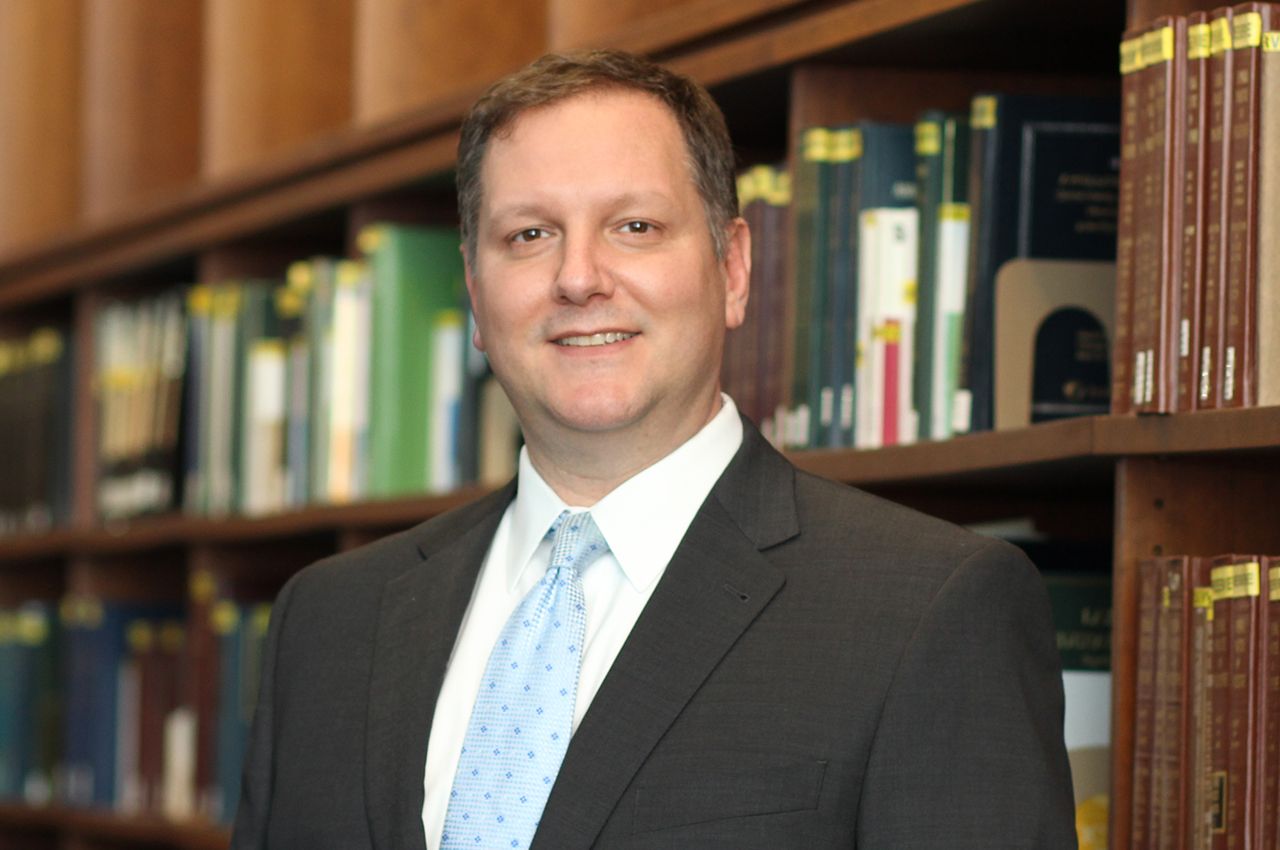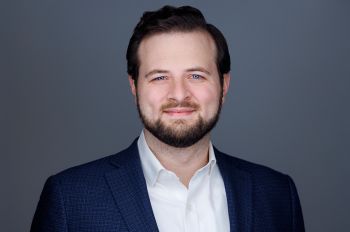Chicago-Kent Associate Dean Celebrates Successful Prosecution of Balkan War Criminals

On May 31, 2023, United Nations appeals judges significantly expanded the convictions of Jovica Stanišić and Franko Simatović, two convicted war criminals who Chicago-Kent College of Law Assistant Professor Adam Weber ’99 prosecuted during his 10 years working as a trial attorney at the Office of the Prosecutor for the International Criminal Tribunal for the former Yugoslavia (ICTY) at the U.N. in The Hague, Netherlands.
“The greatest feeling is that there’s been a sense of justice delivered to entire nations, to an enormous number of victims devastated by the events in the former Yugoslavia,” says Weber, who is also associate dean of international programs at Chicago-Kent.
The ICTY is a special court that was established in the wake of the Yugoslav Wars, an armed conflict that resulted in the breakup of the former Yugoslavia into six modern nations: Slovenia, Croatia, Bosnia and Herzegovina, Montenegro, Serbia, and North Macedonia. The conflict took place from 1991–2001 and is noted for being particularly brutal.
“The ICTY was the first time since the Holocaust where the international community got together and thought the crimes were significant enough to merit an entire international tribunal,” says Weber. “The legacy of the tribunal will be enshrined as an international body that carried out and successfully completed its mandate by adjudicating crimes that defied all notions of humanity.”
The International Center for Transitional Justice estimates that around 140,000 people were killed in the conflict. The prosecution of Yugoslav war criminals was the first time that the international community ruled that mass wartime rape is a crime against humanity. Weber notes that the term “ethnic cleansing” is the term that rose to prominence in the 1990s to describe the conflict.
“When we’re talking about ethnic cleansing, we’re talking about large-scale mass atrocities carried out against parts of the civilian population over huge swaths of territory,” Weber says. “The crimes that were committed were persecution, targeting people based on their ethnic or religious background, along with large-scale murders and exterminations. Those are all crimes against humanity, and eventually what happened in Srebrenica was to the scale of genocide.”
Stanišić and Simatović were first tried by Weber from 2009–13. Stanišić worked as the chief of the State Security Service of the Republic of Serbia it’s intelligence agencyunder former Serbia President Slobodan Miloševic. Simatović is often described as Stanišić’s right-hand man.
Prosecutors accused the two men of secretly establishing Special Forces who deployed to areas of Croatia and Bosnia, including notorious paramilitary groups known as the Serb Volunteer Guard, Red Berets, and the Scorpions that terrorized the non-Serbian population throughout the region.
“[Stanišić and Simatović] armed, financed, and deployed covert death squads—kill units—into different areas of Croatia and then Bosnia, where they inflamed the ethnic tensions, carried out mass executions, all these things, before the military came in and would rape, deport, and mass slaughter the rest of the population,” says Weber.
Weber worked on the case for nearly 10 years and provided opening statements, closing arguments, and led significant insider witnesses from the perpetrator groups during the trial proceedings.
On May 30, 2013, the Trial Chamber acquitted both men of all charges.
“I tried the entire first case. We were devastated and believed that we presented sufficient evidence to convict Stanišić and Simatović. The original trial chamber even factually found that the accused had made most of the contributions we had alleged in the indictment, but applied a legal standard that we did not think was right,” says Weber.
Weber continued his work prosecuting others for genocidal actions during the Yugoslav Wars. He helped secure lengthy sentences for cousins Milan and Sredoje Lukić, who were convicted of murder, torture, and extermination. In what is possibly his most well-known case, he also helped secure the conviction of General Ratko Mladić, the highest-ranking military officer prosecuted at the tribunal. Milan Lukić and Ratko Mladić received natural life sentences.
But the sting of the loss of the Stanišić and Simatović case never went away. Weber admits that the clandestine nature of the activities of the special units, and the experience of the accused as senior intelligence officials, made the prosecution challenging. The ICTY prosecution had to rely on whistleblowers to connect the defendants to the paramilitary groups and their crimes.
As time went on, those responsible for the worst of the war crimes began to pass away, narrowing the opportunities to hold them accountable and to establish a true historical accounting of what happened in the Balkans in the 1990s.
More than two years after the acquittal, on December 15, 2015, the Appeals Chamber awarded prosecutors their appeal and ordered a retrial on the basis that the “original trial chamber made several legal errors in its assessment of the facts,” according to Weber. International law does not award defendants the same “double jeopardy” protections enjoyed by defendants in the United States.
Weber used his knowledge from the first trial to get the retrial team prepared for the new case. He delivered opening statements but left the U.N. before the retrial concluded in 2021 where they were convicted for aiding and abetting murder and other crimes in the Bosnia town of Bosanski Samac in 1992. They were sentenced to 12 years.
Weber still wasn’t satisfied, and neither were many of the victims.
“At the end of the retrial, they only convicted the defendants for a small amount of the crimes,” says Weber. “I think that was an issue. To me, it really wasn’t a full reflection of their level of culpability.”
The second ruling didn’t acknowledge the existence of the Joint Criminal Enterprise, or conspiracy, that linked the government to the paramilitary groups and many of their crimes.
Despite their acquittal on several counts, Stanišić and Simatović decided to appeal their conviction. In March 2023 a five-member panel of U.N. appeals judges, rather than overturning the convictions, expanded them. The appeals chamber found that both men were involved in a joint criminal enterprise for crimes committed throughout Croatia and Bosnia and raised their sentences to 15 years.
It may be nearly three decades since the conflict, but Weber says this conviction matters greatly to victims all over the world. It stands as a historical record that Milosević’s government was responsible for crimes that some officials still refuse to acknowledge.
“It is a profound statement. Some Serbian leaders may not acknowledge publicly what really happened. But a judgement like this does change that equation a bit,” he says. “One of the important things about international criminal justice, it stands the test of time…. The Stanišić and Simatović judgment winds up being the only international judgment at the ICTY that holds officials from Serbia culpable for crimes in Croatia and Bosnia as members of a criminal enterprise and gives justice to the victims of some of the most notorious, ruthless paramilitary groups ever known,” Weber says.
But Weber thinks this judgement represents more than that. It’s about the soul of humanity.
“There’s a reason certain things are called crimes against humanity—because they divide the very notions of what we deem as appropriate for our humankind and what type of acts are acceptable and not acceptable during an armed conflict,” he says. “Are you going to let leaders slaughter people en masse and not say anything about it? Then what happens when the next leader comes to power that does that?"



